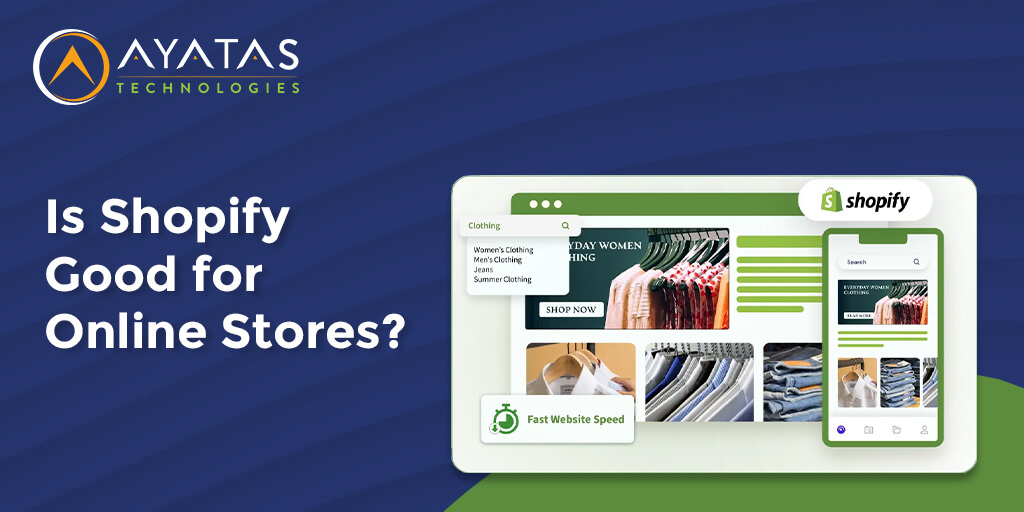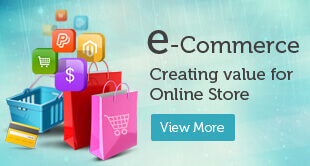
Is Shopify Good for Online Stores?
Shopify is a popular eCommerce platform known for its ease of use. It is a great choice for all businesses to build their online store. However, like similar platforms, Shopify has its pros and cons. A common question that many business owners ask is, “Is Shopify good for online stores?” With so many eCommerce platforms to choose from, picking the right one is important for your business’s success. This article will help you decide whether it is best for you.
What is Shopify?
Shopify is a SAAS platform used by budding or existing businesses to set up their online stores and sell their products in the online market. Shopify provides a seamless dashboard to manage sales, accept payments, and market products. Its pricing starts at $29 per month. Shopify helps businesses sell their products in multiple locations. They can sell on their Shopify store, marketplaces like Amazon, and social media platforms. With the Shopify POS app, sellers can sell products anywhere, including in physical stores, pop-up shops, and markets.
Why Choose Shopify for Your Online Store?
User-Friendly Interface
One of the best things about Shopify is its ease of use. Even if you’re not good with technology, you can easily find your way around because of its simple design. Setting up a store, adding products, and managing orders are made easy with just a few clicks.
Customization Options
Shopify gives you several options to customize your store so that you can see your brand how you want it to be. You can choose from free or paid themes to design your store’s appearance and features to match your expectations.
Pros and Cons of Shopify
Pros
- User-friendly
- More than 6,000 app integrations
- Abandoned cart recovery
- 24/7 customer service
- Up to 88% of shipping discounts
- You can sell online and in person
Cons
- Limited options for customization
- Pricey high-tier plans
- Free themes are limited
- Transaction fees will be charged irrespective of Shopify payment usage
How Shopify works?
Shopify was built in Canada in 2006 by a German-born teen, Tobias Lütke. He wanted to build an online store and sell snowboards. Later, he realized that the tools in the platforms were complicated and wanted to create one that was easy to use for himself. He found it interesting and wanted others to create their website on the platform. That’s how Shopify was created. Today, Shopify powers around 4.8 million online stores, has generated over $1 trillion in sales, and is used by millions of merchants in 175 countries.
Shopify runs on its servers as a hosted solution, so you don’t need to worry about web hosting or software installation; you can build and manage your store directly from a web browser. The platform has everything you need to start and market an online store, including templates, a payment processor, and a content management system. While its built-in features have almost everything. If you aren’t satisfied with the existing features, you can customize your store with apps or custom code. Shopify is a ‘Software as a Service’ (SaaS) product, so you pay a monthly fee to access it.
Key Features of Shopify
Shopify is known for its features and ease of use. Below are some key features that make it a preferable choice for business owners.
1. Ease of Use
Shopify is simple to use, and its interface is attractive, modern, and has a good user experience. You don’t need any technical knowledge to operate the platform. After signing into Shopify, you need to answer some questions so that it shows you the features that suit you. From here, opening your store, uploading product images and descriptions, and setting up shipping and payments is easy. The navigation is simple; you can access the pages through the menu on the left side of your store dashboard.
Shopify also provides an AI feature called Shopify Magic. This tool generates descriptions based on the keywords given, saving you time while setting up the product catalog.
2. Customization
Shopify is a user-friendly platform that allows customization to make your store look unique. You can use Shopify apps to add new features, like advanced blogging tools or drop shipping options, which are easy to install. To change your store’s appearance, you can use Shopify’s themes to adjust the layout and design, such as adding sections to the header, banner, or footer. If you are unhappy with the outcome and want to add more unique functionalities and features, you can code. Shopify provides various ways to customize your store, whether you’re comfortable coding or prefer simpler tools.
3. Shopify App Store
Shopify’s app store is a great to customize and enhance your store. 8,000 free and paid apps are available, much more than any other ecommerce platform offers. These apps can help you add features like selling digital products or setting up email hosting. To make things easier, Shopify recommends popular apps and organizes them into six categories so you can quickly find what you need. Useful apps include PageFly Landing Page Builder for store design and Xero, Hubspot, and Zendesk for management. If you need help improving your store’s look or which apps to use, check out some Shopify website examples for inspiration.
4. Variety of Themes
Shopify is known for its themes. It has over 150 well-designed options. These themes can be found in the Shopify Theme Store and are available in both free and paid themes. There are currently 12 free themes and around 150 paid ones. Although this is fewer than other platforms like Wix, which has over 800 themes, Shopify’s themes are high-quality and fully responsive to any device. They also include important SEO features like fast loading and clear call-to-action buttons.
Some themes, like jewelry, are designed for certain industries to fit your products and customers. Most themes come with two or three variants for more options. If you see a Shopify store with a theme you like, you can use the Shopify Theme Detector, a third-party tool, to identify it and get inspiration.
5. Shopify Payments
Shopify offers two main ways to handle payments in your store: Shopify Payments and third-party payment gateways like PayPal and Amazon Pay. Shopify Payments is a cost-effective and easy-to-use option with your account, so there’s no need to add it separately. This payment method has several advantages, including no extra transaction fees, except for the “Starter” plan, a 5% fee per sale that needs to be paid if you opt for the starter plan. Also, you avoid lengthy verification processes and benefit from secure payment data with encryption and PCI-compliant servers. For physical stores, Shopify POS allows you to use Shopify’s payment system to accept credit cards, manage inventory, and view all your data in one place.
6. Hosting and Security
Shopify is a hosted platform, so you don’t need to pay for hosting or your domain name. Shopify servers manage everything; you log in and start selling. This means you can access strong security features, including PCI-compliant protection for credit card transactions. Shopify also keeps your apps and plugins up to date, so you don’t have to update them. The platform is highly trustworthy, which is crucial for online stores, especially those with international customers who need to access products anytime.
7. SEO and Marketing
Since most buyers find products through search engines like Google, having good SEO is very important to scaling your business. Shopify helps with your store’s SEO using various tools. It makes on-page SEO simple by allowing you to manage alt text, headings, page titles, and meta descriptions. You can also use the paid Yoast SEO tool for a complete dashboard to manage on-page SEO.
For off-page SEO, Shopify lets you control which URLs search engines can crawl and set 301 redirects to navigate users from broken links to the main pages. Shopify offers built-in marketing tools like Shopify Blog, Shopify Forms, and a limited email marketing tool. You can track and adjust your campaigns and analyze your marketing performance using Shopify’s analytics and reports.
8. 24/7 Customer Support
Shopify offers good customer support with its Help Center. It has detailed guides on everything from starting your store to managing and scaling it. The help materials that are required for your assistance are available in 21 languages. Help Center mostly provides text-based assistance; you can get more detailed assistance by contacting Shopify’s 24/7 support through chat, email, or a call. Shopify’s support representatives are available to provide immediate help. If you need technical help, like coding assistance, the Shopify Community Forum is a great resource where experienced store owners and developers can answer your queries.
Shopify Pricing
Basic @ $29
You can sell as many products as possible and use features like abandoned cart recovery and gift cards. Shopify charges a 2% fee for each sale unless you use Shopify Payments.
Shopify @ $79
You can create five extra accounts for your employees. If you don’t use Shopify Payments, Shopify charges a 1% fee per sale, but you’ll also get lower fees for card processing.
Advanced Shopify @ $299
You’ll get advanced reports and automatically calculated shipping rates. The transaction fee is 0.6% unless you use Shopify Payments.
Shopify vs. Competitors
Shopify vs. WooCommerce
WooCommerce is a preferred option for WordPress users, but how does it compare to Shopify? WooCommerce gives you more flexibility but requires more technical knowledge and regular maintenance. Shopify is an all-in-one solution that easily manages hosting, security, and updates.
Shopify vs. BigCommerce
BigCommerce is another strong eCommerce option. It has powerful features like Shopify, but some people find BigCommerce’s interface harder to use. Shopify’s App Store and community support are available, which makes it better for customizing and improving your store.
Conclusion
Is Shopify the right choice for your online store? For many businesses, the answer is yes. Shopify has an easy-to-use interface, powerful features, and strong community support, providing everything you need to create and grow a successful online store. It may be costly for many business owners, but it offers the best value for your investment. Ayatas Technologies is dedicated to helping businesses succeed online by offering top-notch Shopify development services. Whether you’re looking to build a new online store or enhance an existing one, our team of experts is here to deliver customized solutions that meet your specific needs. Contact us now to take your business to the next level!



